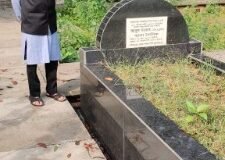
By Taslim Ahammad:
On one occasionthe loved one passes away, it may be a difficult time for one and all. Grieving is a natural part of the process, and taking time off from work may be an essential step in honouring and saying goodbye to the deceased. In Bangladesh, there are regulations in place that provide employees with the right to take time off work for a funeral. This is known as funeral leave, and it is an important benefit that helps employees to cope with the loss of a loved one.
Funeral/bereavement leave taken as a block of time when the family member relationship qualifies for more than one day of leave. Both bereavement leave and funeral leave are considered appropriate and necessary in situations where an employee has experienced a death in the family or other personal loss.
Bereavement leave is normally granted to employees to provide them with time to grieve and handle necessary arrangements following the death of a loved one. This type of leave may be paid or unpaid, depending on the policies of the employer. The length of bereavement leave can vary, but it is usually a few days to a week or more, depending on the relationship to the deceased and the policies of the management.
Funeral leave, on the other hand, is specifically granted for the purpose of attending a funeral or related events. This type of leave is usually shorter than bereavement leave and may be paid or unpaid, depending on the policies of the employer. The length of funeral leave can also vary but is typically only one or two days.In Bangladesh, the leave is provided for in the Bangladesh Labour Act, 2006.According to the Act, every employee who has completed at least six months of continuous service is eligible to a maximum of three days of paid leave for be present the funeral of a spouse, child, parent, sibling, or grandparent. This leave may be extended for an additional two days in exceptional circumstances, such as when the funeral is taking place in a distantplace.
Eligibility, as mentioned above, in Bangladesh, every employee who has completed at least six months of continuous service is entitled to funeral leave. However, there are defining criteria that must be met in order for the leave to be granted.First of all, the employee must be able to make available proof of the relationship between themselves and the deceased. This may be in the form of a death certificate, obituary, or other official documentation.Furthermore, the employee must have a genuine reason for taking the leave. For example, attending the funeral or making necessary arrangements for the funeral.
Duration and legal bindings, in Bangladesh, employees are entitled to a maximum of three days of paid leave for attending the funeral of a spouse, child, parent, sibling, or grandparent. This is in accordance with the Bangladesh Labour Act, 2006.However, if the funeral is taking place in a remote location or other exceptional circumstances arise, the leave may be extended for an additional two days. This extension is at the discretion of the employer, and the employee may be required to provide evidence to support their request for additional leave.Employee may also be required to provide proof of the death, such as a death certificate or obituary, as well as information about the funeral or memorial service.It is important to check with the employer to understand their specific policies regarding funeral leave.The law also prohibits employers from terminating an employee for taking funeral leave or failing to provide funeral leave to eligible employees.If an employer violates the legal bindings for funeral leave in Bangladesh, an employee may have legal recourse and may be able to file a complaint with the labour authorities or seek legal assistance to protect their rights. It is important for both employers and employees to realize the legal requirements and responsibilities when it comes to funeral leave in Bangladesh.
In the direction of ensure funeral leave in Bangladesh, employees should keep an eye on these steps: (i) Inform your employer as soon as possible when employee need to take funeral leave due to the death of a family member (ii) Provide any necessary documentation, such as a death certificate or obituary, to support your request for funeral leave. (iii) Follow employee employer’s policies and procedures for taking funeral leave (iv) Use funeral leave properly and only for the purpose of attending the funeral or making essentialpreparations (v) If employee funeral leave request denied or employee believe their rights have been violated, consult with an employment lawyer for assistance and support.
When somebody needs to request funeral leave, it is important to follow the employer’s policies and procedures for doing so. In Bangladesh, this may involve notifying the supervisor or human resources department as soon as possible after the death of loved one. Through following the above steps, employees may ensure that their funeral leave requests are processed in a timely and fair manner and that they receive the support they need to attend to their family’s needs during a difficult time.
In summary, funeral leave is an important benefit that needs to provide employee with the time off they need to attend the funeral, make necessary arrangements, and grieve the loss of a loved one. In Bangladesh, the Bangladesh Labour Act, 2006, provides employees with the right to a maximum of three days of paid leave for attending the funeral of a spouse, child, parent, sibling, or grandparent. During the time, someoneneeds to take funeral leave, need to be sure to follow the employer’s policies and procedures for requesting for the leave. This will ensure that the employees receive the leave they are entitled to and may properly honouremployees loved one.
Taslim Ahammad
Assistant Professor, Department of Management Studies
Bangabandhu Sheikh Mujibur Rahman Science and Technology University, Gopalganj, Bangladesh
 Weekly Bangla Mirror | Bangla Mirror, Bangladeshi news in UK, bangla mirror news
Weekly Bangla Mirror | Bangla Mirror, Bangladeshi news in UK, bangla mirror news





